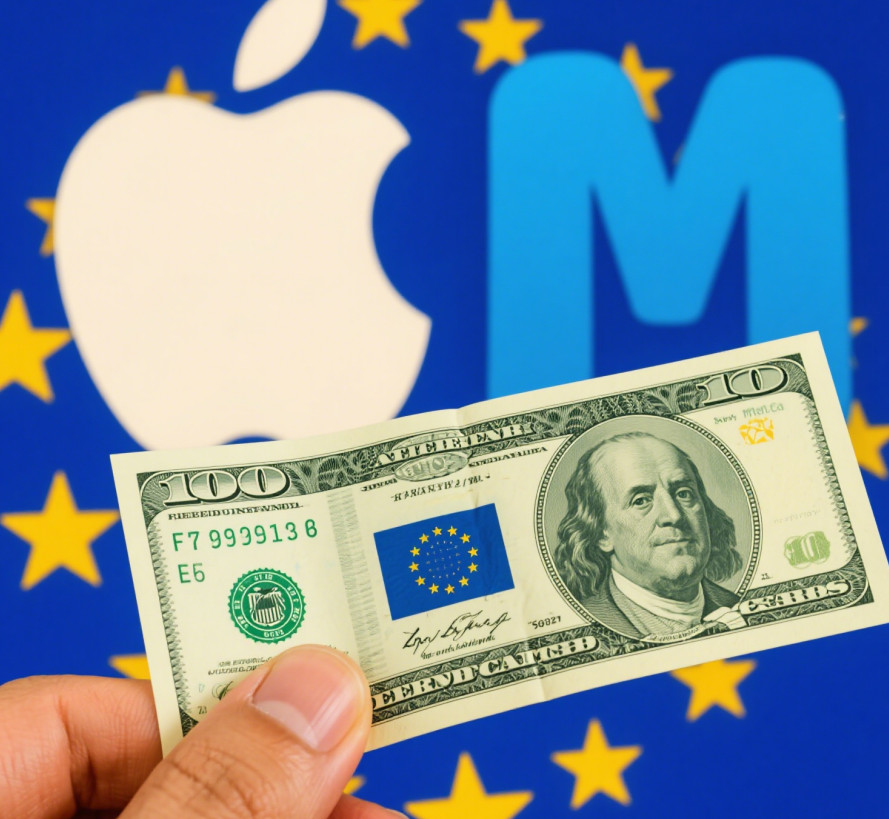
Recently, the European Union fined Apple 500 million euros and Meta Platforms (formerly Facebook) 200 million euros under the Digital Markets Act (DMA), which has sparked widespread attention and discussion in the technology industry. This fine not only demonstrates the EU's determination to regulate large technology companies, but also marks a new stage in digital market regulation, and brings a series of issues worth exploring in depth.
The EU's fines on Apple and Meta have a clear regulatory logic. Apple was fined for failing to inform users of the existence of other apps outside the App Store, which hindered users from downloading apps and violated EU regulations. This behavior of restricting user choices not only harms the interests of consumers, but also undermines the fair competition environment in the digital market. Meta was fined because it launched the alternative mode of "agree to data collection or pay subscription" and did not provide users with the legal option of "low data usage advertising service", which deprived users of the right to freely choose consent. This model not only violates users' privacy rights, but also goes against the principle of fair competition in the digital market.
The EU's punishment of these two companies based on DMA reflects its maintenance of the digital market order and protection of consumer rights. DMA aims to clarify the responsibilities of digital service providers, curb malicious competitive behavior on large network platforms, and promote fair competition and innovative development in the digital market. This fine is a landmark case since the implementation of DMA, sending a clear signal to global tech giants that in the EU market, relevant regulations must be followed and consumer rights respected.
This fine has had a profound impact on the technology industry. On the one hand, it serves as a warning to other tech giants. Other large technology companies may therefore scrutinize their business practices more cautiously to avoid violating EU regulatory requirements. This will encourage the technology industry to pay more attention to compliant operations and promote the healthy development of the industry. On the other hand, for startups, this is good news. The EU's strict regulation of large technology companies has created a fairer competitive environment for startups, enabling them to gain more opportunities in the market and promoting innovation and development in the digital market.
However, the EU's regulatory measures also face some challenges and controversies. On the one hand, although the fine amount is below the upper limit of 10%, it may still exacerbate the tense relationship between the European Union and US President Trump. Trump has threatened to impose tariffs on countries that punish American companies, which could have a negative impact on trade relations between Europe and the United States. On the other hand, overly complex regulatory oversight has also made the European market increasingly closed in the innovation ecosystem. Large tech companies are avoiding Europe in promoting AI technology, such as Apple announcing that it may not launch AI features in Europe in 2024 due to regulatory considerations. This indicates that although strict regulation by the EU can to some extent maintain market order and consumer rights, it may also have a certain inhibitory effect on technological innovation.
The EU's fines on Apple and Meta are an important milestone in digital market regulation, reflecting the EU's determination to maintain market order and consumer rights. However, this measure also brings a series of challenges that require finding a balance between regulation and innovation. In the future, with the continuous development of digital technology and changes in the market, technology regulation will face more complex issues, requiring joint efforts from regulatory departments, technology companies, and all sectors of society in various countries to explore more effective regulatory models and promote the sustainable development of the digital market.

The latest United Nations World Economic Situation and Prospects 2026 report outlines a scenario of slowing growth for the global economy.
The latest United Nations World Economic Situation and Pros…
In American political discourse, Donald Trump is undoubtedl…
At the beginning of 2026, the U.S. Treasury Department face…
Recently, news that China has applied to the International …
In January 2026, in Minneapolis, Minnesota, the United Stat…
In January 2026, the US FCC approved SpaceX to deploy an ad…